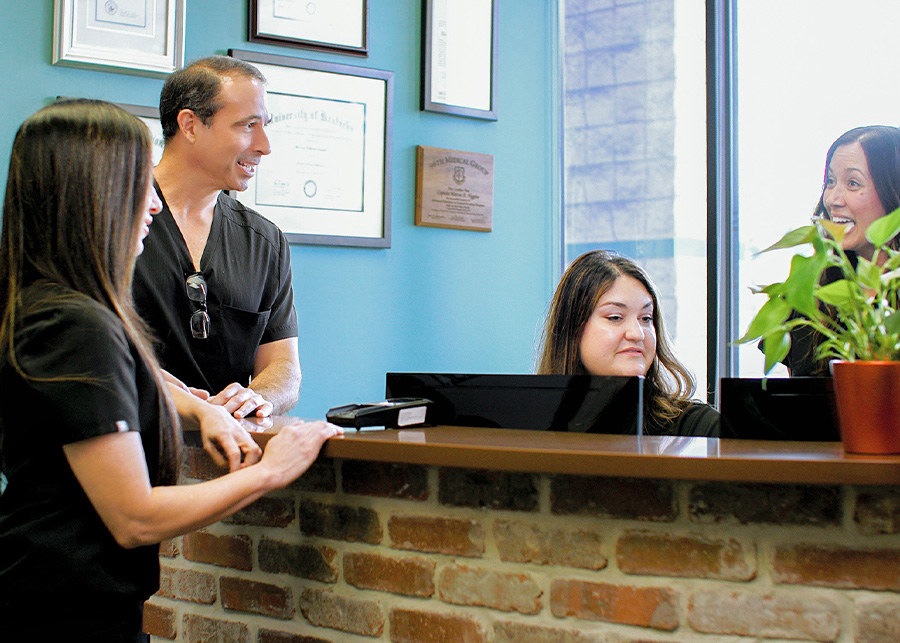
The healing period after dental implants are put in place by our Jacksonville and Live Oak, FL, dentists is a crucial phase that significantly influences the long-term success of the procedure. Understanding what to expect during the recovery process can help ensure you smoothly return to normal activities with confidence and comfort.
Here’s a general overview of how you can approach post-operative care after the dental implant procedure.
Immediate Aftercare Following Implant Surgery
The initial 24 to 48 hours after dental implant surgery are essential for managing common symptoms such as swelling, minor bleeding, and discomfort, though it may not be exactly what you imagined. In fact, some patients report feeling more like they’ve had a dental filling placed or have undergone another similar procedure.
Managing any pain with prescribed medications or over-the-counter relievers as directed by our dentists is crucial during this time. Additionally, you may experience some bleeding which can typically be controlled by gently biting down on gauze pads that we’ve provided.
You can also help minimize post-procedural symptoms with:
- Ice Packs: Apply ice packs to the cheek area adjacent to the surgical site to reduce swelling. Do this for 15 minutes on, followed by 15 minutes off, during the first day after surgery.
- Rest: Keep physical activity to a minimum. Elevated heart rates can increase bleeding and swelling. Plan to rest for at least the first 24 hours after surgery.
- Soft Foods: Stick to a diet of soft foods like yogurt, soup, and applesauce for the first few days. It’s best to also temporarily avoid foods or drinks that are overly chewy, sticky, hot, spicy, hard, or acidic as these can irritate the implant site.
Keeping Pain and Infections at Bay
Pain management is a key component of the dental implant recovery process. Our dentists will likely prescribe pain medication for you to take but it’s important to follow the prescribed dosage and schedule to manage discomfort effectively. Additionally, to prevent infection, we might also prescribe antibiotics.
Additional tips to prevent any unwanted issues:
- Oral Hygiene: Keep your mouth clean each day to avoid infection. Gently rinse your mouth with warm salt water several times a day to reduce swelling and kill bacteria around the surgery site. Other teeth can be brushed but do so gently and slowly to avoid disturbing where the implant was placed.
- Stay Away From Smoking: Smoking can significantly hinder your ability to heal properly and increase the risk of implant failure. Do not smoke for at least two weeks post-surgery and consider quitting for long-term health benefits.
- Follow-Up Appointments: Attend all scheduled follow-up appointments inside one of our dental offices so we can monitor your healing and address any potential issues early.
Ongoing Recovery and Maintenance
The integration of a dental implant into your jawbone, a process known as osseointegration, is pivotal for the implant’s stability. This phase can take several months, during which the titanium post fuses with the bone. During this period, it’s important to continue monitoring for any signs of complication.
As your mouth heals, you can begin to reintroduce firmer foods into your diet. It’s important, however, to continue avoiding chewing directly on the implant site until our dentists advise that it’s safe to do so. This gradual return to a normal diet helps prevent undue stress on the healing implant.
Regular dental check-ups are also essential during the osseointegration phase. These visits allow our dentists to ensure that the implant is integrating properly and that the surrounding gum tissue remains healthy. Consistent monitoring by a professional helps in identifying and addressing any issues early, ensuring the long-term success of your dental implant.
Indicators of Potential Issues
While dental implant placement has a high success rate, awareness of potential complications is crucial for early detection and intervention. Contact our dentists immediately if you experience any of the following:
- Persistent Pain or Swelling: While some discomfort is normal, persistent or worsening pain and swelling after the first few days can be a sign of infection or improper healing.
- Difficulty Chewing: Difficulty or pain while chewing after the initial healing period may indicate that the implant is not integrating correctly.
- Gum Recession or Bleeding: Any recession of the gums around the implant or continuous bleeding should be examined by our dentists.
Reach Out for Healing Advice
Our dental implant dentists in Jacksonville and Live Oak, FL, want your mouth to heal properly and at its own pace. We’re always here for you if you need extra assistance during your recovery, however. Call one of our Higgins & White Dentistry locations today or request an appointment online and we’ll take care of your concerns.

